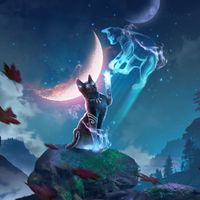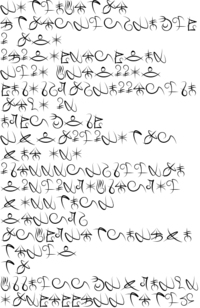Illusion is one of the six schools of magic. It is similar to Alteration magic in that it seeks to change the world around the caster so normal physical truths no longer hold, but while Alteration magic is bound by the laws of nature, Illusion magic is not. Its weakness comes from the fact that while Alteration affects the entire world, Illusion magic affects only the caster and the target.[1] Illusion spells can change a target's visibility, produce or remove light, produce or remove noise, charm a creature, induce hatred in it or calm it down, enhance or remove a creature's courage, prevent a creature from seeing or moving, or allow the target to see even in total darkness. The ability to enforce the caster's will on a target is also now part of this school, despite having once been considered to be Conjuration magic.
Possibly the most infamous use of Illusion magic came in 3E 389 when Jagar Tharn used it to imprison Uriel Septim VII and assume his shape, enabling him to rule the empire in his stead for a decade.[2] In 3E 431, the Council of Mages decided that Illusion magic in Cyrodiil was to become the responsibility of the guildhall in the town of Bravil.[3]
- Visibility spells come in two forms: invisibility and chameleon. The former totally removes the target from plain sight but is dispelled should the target perform any action other than simply moving around. The latter form bestows a level of transparency to the target as determined by the caster. This can range from very small amounts that leave the target largely in plain sight up to total invisibility, but in a form that is not dispelled by normal actions. The drawback is that high-level chameleon effects are very costly to cast.
- Light spells are largely self-explanatory. They produce light of a chosen brightness and radius in an area. In theory, Illusion magic should be capable of producing darkness, but such an effect is yet to be developed by mages.
- Noise spells also come in two forms. One type prevents the target from making any form of noise. This is an especially-useful attack against mages, as it prevents them from casting any of their spells. The other form, one that has fallen out of favor in recent years, causes the target to hear a noise, ranging from a soft murmur to a deafening cacophony. This can be distracting to the extreme, and can even inflict damage.
- Another spell that has fallen out of favor is the blindness spell. This reduced the target's ability to see, ranging from a slight darkening of vision to total blindness.
- Paralysis spells are immensely powerful, and can prevent the target from moving in any way.
- Night-eye spells are like light spells in that they make it much easier for the caster to see in the dark. The obvious difference is that night-eye affects only the caster, so is of much more use if they are trying to remain undetected.
- A major part of Illusion magic involves changing a target's reactions. Frenzy and Calm increase and decrease the target's aggression, making it more or less likely to strike out - even to the point of attacking allies or ignoring deadly enemies. Demoralize and Rally do the same for the target's courage: the doughtiest warrior may flee if hit by a strong demoralize spell, while a rally spell may make the most craven coward stand and fight. Lastly, Charm spells change the target's response to the caster, and can turn even the deadliest of foe into a helpful ally.
- Clairvoyance can be utilized to determine a pathway to certain distant objects and people, or see visions of their location.
- Muffle spells can be used to dampen the noise produced by worn armor, making it easier to avoid detection.
See AlsoEdit
- Game-specific information for Daggerfall, Morrowind, Oblivion, and Skyrim.
- For an overview of how Illusion spells have changed throughout the series, see the General article on Magic.
BooksEdit
- Incident in Necrom by Jonquilla Bothe — A story about an illusionist
- Palla by Vojne Mierstyyd — A conjurer's tragic infatuation with a dead woman
- Silence by Ganpheril Kimeth — How an adventurer's fight with a powerful mage was aided with a simple Silence spell
- Simple Illusion Magic by Ninaleon Sightbinder the First — The contents page of a beginner's guide to illusion magic

